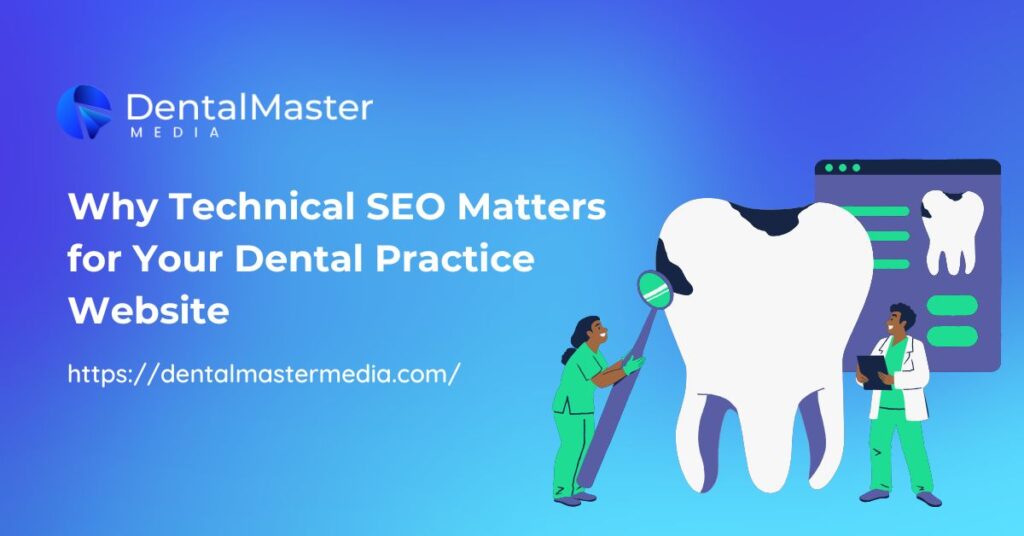In today’s digital landscape, having a visually appealing and informative website is just the beginning. For dental practices aiming to grow their patient base, the real game-changer lies in technical SEO — the behind-the-scenes optimizations that determine how well your site performs on search engines.
While most dentists understand the need for digital marketing, many overlook the importance of technical SEO and how it can drastically improve their online visibility, user experience, and ultimately, patient acquisition.
In this article, we’ll explore what technical SEO is, why it matters for your dental website, and how it fits into the broader strategy of SEO for Dentists.
What Is Technical SEO?
Technical SEO refers to the process of optimizing your website’s infrastructure so that search engines like Google can effectively crawl, index, and rank your web pages.
Unlike content-based SEO, which focuses on keywords and blog posts, technical SEO focuses on the website’s architecture, speed, mobile-friendliness, and security.
Partnering with a Dental SEO Company can help ensure these elements are properly implemented, making your website easy to navigate, accessible to search engine bots, and fully optimized for both user experience and search engine performance.
Why Is Technical SEO Important for Dental Practices?
1. Better Search Engine Visibility
If your dental website isn’t optimized for technical SEO, it may never appear on the first page of Google — no matter how informative your content is. Search engines rely on specific signals to understand what your website is about and whether it provides value to users. Technical SEO ensures those signals are present and accurate.
Let’s say you’ve written an excellent blog post on the benefits of teeth whitening, but your website has slow loading times and broken links. Google might not even index that page, meaning potential patients will never find it. Technical SEO helps eliminate such issues, making sure every piece of content you produce gets the attention it deserves.
2. Improved User Experience
A website that’s slow, hard to navigate, or not mobile-friendly will drive users away — fast. When someone visits your site, they expect it to load within 2-3 seconds, especially on mobile devices. If your technical SEO is up to par, your dental website will provide a seamless experience that keeps users engaged and encourages them to book an appointment.
Google also uses user experience signals such as bounce rate and dwell time in its ranking algorithm. By improving your website’s technical performance, you enhance user satisfaction and increase your chances of ranking higher.
3. Mobile Optimization
More than half of all web traffic comes from mobile devices. If your dental practice’s website isn’t mobile-friendly, you’re missing out on a significant portion of potential patients. Technical SEO ensures that your site uses responsive design, adapts to various screen sizes, and delivers a consistent experience across all devices.
Google’s mobile-first indexing means the search engine primarily uses the mobile version of your site for ranking and indexing. So, if your mobile site is slow or incomplete, your overall rankings could suffer.
Key Technical SEO Elements Every Dental Website Needs
1. Fast Loading Times
Speed is one of the most critical technical SEO factors. A slow-loading site frustrates users and increases bounce rates. Tools like Google PageSpeed Insights and GTmetrix can help you evaluate your website’s performance and identify areas for improvement.
To speed up your site:
- Compress images without sacrificing quality
- Use a content delivery network (CDN)
- Minimize HTTP requests
- Enable browser caching
- Optimize CSS and JavaScript files
2. HTTPS Security
Security is essential, especially for medical-related websites like dental practices. An HTTPS-enabled site not only protects sensitive user data but also signals trust to visitors. Google gives preference to secure websites, making SSL certificates a must-have for SEO.
If your dental site still uses HTTP, it’s time to make the switch to HTTPS. Not only will this help your SEO rankings, but it will also reassure your patients that their information is safe.
3. Clean URL Structure
URLs should be simple, readable, and include relevant keywords to improve both user experience and search engine indexing.
A clean URL structure makes it easier for visitors to understand what the page is about before clicking, enhancing clarity and trust while also helping search engines better interpret the content of your site.
4. XML Sitemaps
An XML sitemap is a file that lists all the pages on your website, helping search engines discover and crawl your content efficiently. While most CMS platforms like WordPress generate these automatically, it’s essential to ensure your sitemap is up-to-date and submitted to Google Search Console.
For a dental website, make sure your sitemap includes:
- Home page
- Service pages (e.g., root canals, teeth cleaning, Invisalign)
- Blog posts
- Contact page
- Appointment booking page
5. Robots.txt File
This file tells search engines which pages of your site they should or shouldn’t crawl. A misconfigured robots.txt file can block important pages from being indexed, hurting your visibility. Make sure your robots.txt file is properly set up and doesn’t accidentally prevent Google from accessing critical parts of your site.
6. Schema Markup
Schema markup is a type of code that helps search engines understand your website content better. For dental practices, this could include structured data for:
- Business hours
- Reviews
- Services offered
- Appointment scheduling
By adding schema markup, your website may appear in rich snippets (enhanced listings in search results), which can increase click-through rates and drive more traffic.

Common Technical SEO Mistakes on Dental Websites
Many dental seo websites fail to address key technical SEO issues, including:
- Broken links or 404 errors
- Missing alt text on images
- Duplicate content
- Inconsistent NAP (Name, Address, Phone number) details
- No SSL certificate
- Non-responsive design
- Poor internal linking structure
Fixing these problems not only improves SEO but also makes your site more trustworthy and user-friendly. Regular site audits using tools like SEMrush, Ahrefs, or Screaming Frog can help you identify and resolve these issues.
How Technical SEO Complements Content SEO
Content marketing — such as blogging about dental procedures, oral health tips, and FAQs — is a vital part of online growth. But without the right technical foundation, your content may never reach your audience. Technical SEO ensures that your content is discoverable, fast-loading, and optimized for every device.
Think of it this way: content is the message, but technical SEO is the delivery system. Without both, your dental practice won’t reach its full digital potential.
The Role of Technical SEO in Local Search
For most dental practices, attracting local patients is the goal. Technical SEO plays a significant role in local search optimization by ensuring your site loads quickly and is mobile-optimized, secure, and properly indexed. These factors help your Google Business Profile perform better and improve your chances of showing up in the local 3-pack (the top three local listings that appear in map results).
Make sure your website includes:
- Local keywords (e.g., “Chandler family dentist”)
- Consistent NAP details
- Embedded Google Maps
- Reviews and testimonials
- Location-specific service pages
When combined with local SEO strategies, technical SEO forms a powerful foundation for attracting nearby patients who are actively searching for dental services.
Partnering With an SEO Professional
Managing technical SEO can be complex, especially for busy dental professionals. Partnering with an experienced digital marketing agency that specializes in SEO for Dentists can help you implement best practices, avoid common pitfalls, and stay ahead of algorithm changes.
These professionals can:
- Conduct comprehensive website audits
- Improve site speed and mobile responsiveness
- Optimize crawlability and indexing
- Implement schema markup
- Fix broken links and duplicate content
- Monitor site performance and make continuous improvements
By outsourcing technical SEO, you free up more time to focus on your patients while ensuring your online presence is optimized for success.
Conclusion
Your dental practice website is often the first impression potential patients have of your brand. Ensuring that it’s technically sound is just as important as creating engaging content or running Google ads.
A strong technical SEO foundation enhances visibility, boosts user experience, and increases trust — all essential for turning website visitors into loyal patients.
In a competitive digital market, mastering SEO for Dentists means not only writing great content but also paying attention to the technical details that make your site stand out in search results.
Don’t let technical issues hold your dental practice back. Invest in technical SEO today and watch your online visibility — and your patient base — grow.

Suraj Rana is the owner of Dental Master Media and a leading expert in SEO for dental practices. With a passion for dental marketing, he has successfully helped numerous dental clinics climb the search engine ranks. Suraj’s expertise makes him a go-to resource for effective, results-driven dental marketing.

